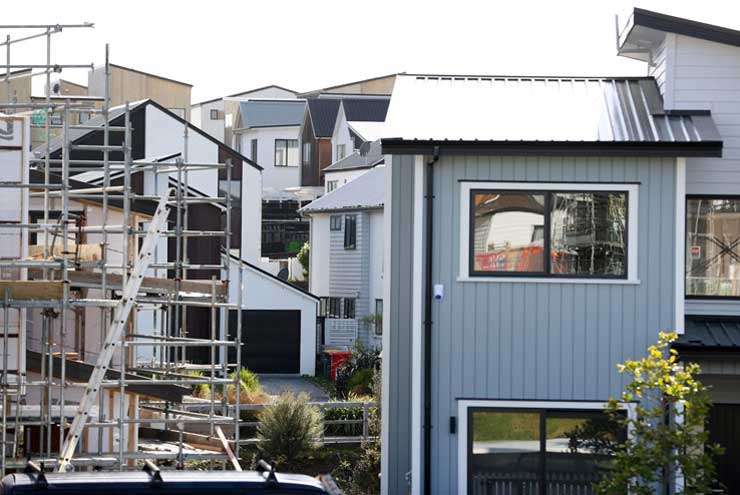First home buyers are being warned to watch what they sign.
Thanks to Kiwisaver and other sweeteners it’s often best for first home buyers to buy new. They typically get twice the Kiwisaver (first home grant) and have an exemption to the Reserve Bank of New Zealand’s strict loan-to-value-ratio (LVR) rules.
On the other hand, the contracts are often heavily weighted against buyers who can have the rug pulled from underneath them if developers can’t complete the build, or want a way out to sell for more.
One of the big issues currently, says independent economist Tony Alexander is “sunset clauses”. These clauses say that if a specified event, such as getting council approval, or completing the build, doesn’t happen by a certain date, one or both parties can cancel the contract.
Start your property search
There can be genuine reasons for invoking sunset clauses. If a developer simply can’t finish a project, then cancelling it means the buyer’s deposit is returned. Buyers sometimes accuse developers of dragging the chain in the hope of cancelling the contract and reselling the home for more.
Property lawyer Nick Kearney, of Davenports Law, is acting currently in the High Court on behalf of a client whose contract was cancelled. A clause in the sale and purchase agreement the client had signed allowed the developer to cancel if consents could not be obtained within a certain time period.
Between the signing of the contract and the build property prices had risen significantly, says Kearney. “It’s our position that the developers thought they could get another half million dollars. I think the developer thought, ‘We'll use this clause, get out, and sell it somebody else’. They didn’t offer our guy any price increase. But they did with another buyer in the complex.”
The developer had obtained resource and building consent and the build was almost complete when the contract was cancelled on the back of allegedly not getting Watercare approval for wastewater nor final 224C certificate.
“Our investigations lead us to conclude that Watercare had done all of its work and was in the process of granting the approvals. So, our argument is that the developer hasn't tried hard enough. There are terms in the contract that require the vendor to use all reasonable endeavours to satisfy the condition, and we don’t believe they have.” Kearney’s clients have applied to the High Court to declare that the contract was invalidly cancelled.

Economist Tony Alexander says sunset clauses are fast becoming an area of risk for buyers. Photo / Fiona Goodall
Goodlife financial adviser Daniel Carney recommends purchasers of new builds get good legal and financial advice to avoid pitfalls.
“Our clients tend to work with a recommended lawyer who will in the first instance fight to have any sunset clause one-sided in favour of our client. (That is) they can pull out, not the builder/developer,” says Carney. “Second to that is not to have a sunset clause altogether.”
Carney and others say to choose a long-standing trusted developer. “Trusted brands would never, in their wildest dreams, ruin their brand by pulling the rug out from clients in the final hour and enact a sunset clause, leaving the buyer high and dry,” he says.
Sarah Manning, partner at Mortlock McCormack Law, agrees that sunset clauses benefiting developers should be avoided where possible. But the ability of buyers to do this depends on their negotiating position. “If acting for buyer I always try to get the sunset clause to just be in favour of the buyer. But the sellers pretty much always push back.”
In Christchurch at the moment, a shortage of available sections currently, for example, means buyers may not have negotiating power. “With 50 or 60 other people on the list, buyers have been forced to accept the seller’s terms,” says Manning.
The other issue, says Alexander, is buyers may get a contract without the sunset clause, but it won't be a fixed price contract. “If I was developing a property I would not want to commit to a fixed price, without allowing for the unpredictable increase in materials charges, the availability of labour, [and] the cost of labour. It simply wouldn't be very astute business practice in this environment to take that sort of a risk.
“My concern is that we're facing an environment where a lot of individuals who haven't done property development before are getting into the sector there and the government is actively encouraging it.

Experts urge buyers to seek out trusted developers. Photo / Fiona Goodall
“It is going to lead to some of these developers simply outright failing and trying to prevent the failing initially by either exercising sunset clauses or going to the buyer and saying ‘I'm sorry, but I can't actually complete this project. The only way you can get your house is if you pay me another x hundred thousand dollars’.”
The issue for developers, says Alexander, is lenders make it a condition of lending that they have a fixed price contract. The sunset clause gives them a way out if they can’t complete the build within the fixed price. “You may get a contract without the sunset clause, but it won't be a fixed price contract.”
Finally, Kearney argues that cancellation clauses were more of a danger up until a few months ago, but that could be changing. “I think (invoking sunset and related clauses) is a very risky thing for a developer to do, because the lending rules have just changed.” Potential buyers at the higher price might not be able to borrow thanks to tighter controls on bank lending by the Reserve Bank of New Zealand and changes to the Credit Contract and Consumer Finance Act (CCCFA).
“If a developer thought they could just hold off for a hundred grand more in two years’ time. they may well come completely unstuck with that tactic. They might find that buyers dry up because they can't get the lending and the developers can’t sell the (homes) again.”



